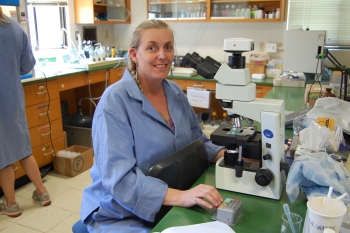
School:
Grade Level:
Teaching Position:
Supervisor:
Department:
Mentor:
Research Project Year:
Research Project Title:
Research Project Description:
The goal of this study was to grow phytoplankton (Thalassiosira weissflogii) and then try to determine if oil had an effect on the development of transparent exopolymers, which will aggregate to form marine snow. These experiments are being conducted to better understand the carbon pump cycle and how released hydrocarbons affect it. Oil from the Gulf of Mexico was used as large marine snow aggregates formed after the Deepwater Horizon accident. We also simulated the rolling motion of the ocean, the temperature, and the lighting. We could not simulate the pressure at which the ocean exerted on the organism, but we did simulate the presence of oil in water suspension (WAF) from being released at that pressure.
All three studies formed marine snow: the control, the WAF, and the straight addition of oil. The volumes in the marine snow were highly variable and showed no difference between any of the studies. Total live background cell counts indicated that the phytoplankton count in the control tanks was 25% higher and had twice the number of dividing cells as the WAF and the oil tanks.
Research Project Attachments:
| Attachment | Size |
|---|---|
| 8.07 MB |
Curriculum Project Year:
Curriculum Project Title:
Curriculum Project Description:
The goal of this project was to improve students understanding of the carbon cycle on a global scale. Using hands-on experiments and data from the science community students will be able to generate, interpret and communicate their findings. The current biology curriculum covers photosynthesis and organisms but mostly excludes carbon, climate change and global warming. Here students will experience in an engaging way the connections between carbon removal from water and air, how ocean stratification affects this recycling, and how an imbalance in the short and long cycles can affect the entire planet. Students will also present possible local solutions and present their findings.
